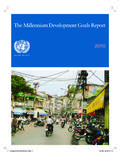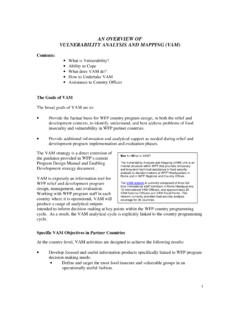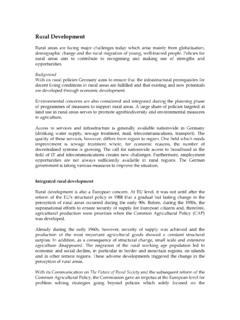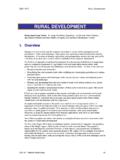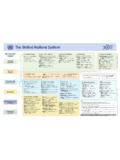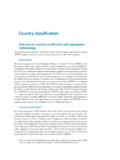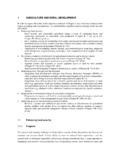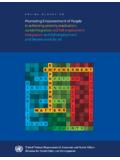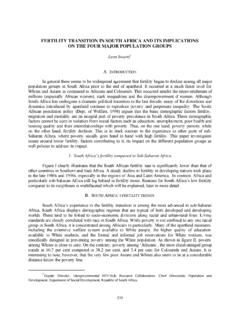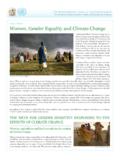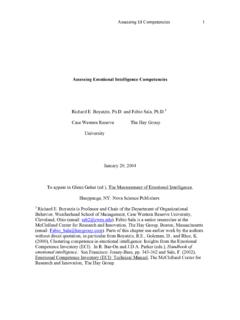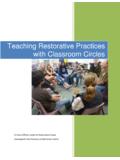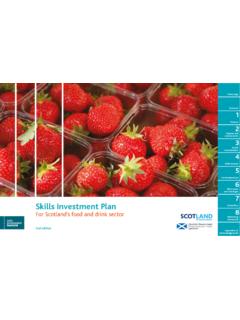Transcription of UNITED NATIONS DEVELOPMENT PROGRAMME
1 UNITED NATIONS DEVELOPMENT PROGRAMME . Contribution to the 14th Session of the UN Permanent Forum on Indigenous Issues Introduction The UNITED NATIONS DEVELOPMENT PROGRAMME 's (UNDP) work and engagement with indigenous peoples1. is grounded on its overall vision to assist countries achieve the simultaneous eradication of poverty and significant reduction of inequalities and exclusion. This involves the three main areas of our work, which consist of developing sustainable DEVELOPMENT pathways, strengthening inclusive and effective democratic governance, and building resilience, particularly from conflicts and natural disasters. In addition, UNDP's work on indigenous peoples is guided and shaped by the international human rights standards and principles, and particularly the UNITED NATIONS Declaration on the Rights of Indigenous Peoples (UNDRIP).
2 Engagement with indigenous peoples has been a focus area within UNDP's overall mission to mainstream a human rights-based approach into its DEVELOPMENT policies and programmes, its global advocacy efforts to fight discrimination and support marginalized minorities, as well as in its long- standing engagement with civil society. UNDP greatly values the contributions of indigenous peoples to humanity's cultural diversity and heritage, climate changes solutions and shares their concerns about economic and social disadvantages and weak political representation. As a trusted multilateral partner serving in 177 countries and territories around the world, UNDP is uniquely positioned to help advocate for the creation of spaces for the meaningful participation of indigenous peoples at the local, national, regional and international levels to ensure that their voices are heard and that they contribute to policy-making and monitor policy implementation.
3 Thus, guaranteeing access to opportunities and supporting an enabling environment, in which indigenous peoples are empowered and can develop their full potential to lead dignified lives in harmony with their world vision, are at the core of UNDP's work. Since the creation of the UN Permanent Forum on Indigenous Issues (UNPFII), UNDP has been closely engaging with the UNPFII and following up on its recommendations in accordance with its mandate. This report is a synopsis of UNDP's progress towards implementing those recommendations and mainstreaming the principles and standards contained in UNDRIP as well as other human rights instruments as they relate to indigenous peoples in 2014.
4 1. UNDP affirms that there is no one universally accepted definition of indigenous peoples. The term "indigenous peoples" refers to distinct collectives, regardless of the local, national and regional terms applied to them, who satisfy any of the more commonly accepted definitions of indigenous peoples. Depending on the national context, indigenous peoples are referred to as "tribal people", "first peoples", "scheduled tribes", "pastoralists", "hill peoples" and also ethnic groups/minorities . 1. At its fourteenth session in 2015, the Permanent Forum will review the following: (a) Outcome of the high-level plenary also known as the World Conference on Indigenous Peoples; (b) Post - 2015 DEVELOPMENT Agenda; (c) Youth, self-harm and suicide.
5 1. Please provide information on how your agency is working with these important issues in the seven socio-cultural regions of the Permanent Forum. Where possible, please include information on the situation of indigenous women in your responses. a) World Conference on Indigenous Peoples 2014 was a watershed year for indigenous peoples worldwide with both the World Conference on Indigenous Peoples and the UN Climate Summit taking place in New York in September, in the context of the opening of the 69th session of the UNITED NATIONS General Assembly. In 2014, UNDP contributed actively to the World Conference preparatory process by engaging actively with member states and supporting indigenous peoples' meaningful participation in the negotiations of the outcome document at the international, regional, national and subnational level.
6 As an active member of the Inter-Agency Support Group on Indigenous Peoples' Issues (IASG), UNDP put in place an outreach and communication strategy in order to ensure high visibility of the conference outside of the UN system. UNDP, through its Indigenous Peoples Liaison Committee (IPLC) furthermore organized and/or co-organized eight side events to allow the strongest possible participation of indigenous peoples outside of the premises of the UN Secretariat. Select country highlights below: Chile The project for the Construction of spaces for dialogue and strengthening of capacities of indigenous peoples in Chile - 2014 supported by Norway, UNICEF, PAHO and UNDP aimed to generate dialogue between the different indigenous groups of Chile and with the UN Country Team (UNCT) in Chile and to incentivize and facilitate indigenous peoples' involvement in the preparatory process leading up to the World Conference of Indigenous Peoples.
7 As a result of this project, over 500 indigenous representatives were able to further strengthen their knowledge of the international instruments that enshrine their rights and to utilize this knowledge in the formulation of a common positioning with regards to the World Conference. In a meeting held in the capital Santiago de Chile in August 2014, in which the Minister of Social DEVELOPMENT , the Director of the National Institute for Human Rights and public servants from the Directorate of Human Rights of the Chancery, as well as members of the UNCT participated alongside indigenous peoples, Dr. Mirna Cunningham presented the draft outcome document of the World Conference urging indigenous representatives to send their observations and comments.
8 The project consisted of three phases: the first was aimed at conducting workshops, training on indigenous rights and information sharing sessions on the World Conference in 24 indigenous communities; during the second phase a space for dialogue amongst indigenous representatives was provided to discuss the objectives and content of the World Conference; and the third phase will focus on obtaining feedback from those indigenous representatives that participated in the World Conference. 2. Equator Initiative The UNDP led Equator Initiative partnership recognises the success of local and indigenous initiatives through the biannual Equator Prize.
9 More than half of the award winners, recognized internationally, identify themselves as belonging to indigenous groups. On the evening of the World Conference on Indigenous Peoples the Equator Prize 2014 Award Ceremony was held at Lincoln Center in New York as a contribution to the UN Secretary-General's Climate Summit and the WCIP. The evening was built around the Equator Prize 2014 winners, twenty-six leading indigenous peoples and local communities from across the planet that are managing ecosystems in a way that meets the challenges of climate change. b) Post-2015 DEVELOPMENT Agenda The Government of Brazil and UNDP co-organized an event (03 05 December 2014) on the Dialogue on the Extractive Sector and Sustainable DEVELOPMENT Enhancing Public-Private Cooperation in the Context of the Post-2015 Agenda event.
10 Representatives from governments, business, civil society, the UN system and academia gathered to discuss the role the extractive sector can play in eradicating poverty and promoting DEVELOPMENT and UNDP invited prominent indigenous leaders to address the event and various sessions. A specific session on Promoting human rights and social inclusion' which looked to how the extractive sector projects are in line with the promotion of human rights and contribute to social inclusion and cohesion was particularly relevant to indigenous peoples including 2. interactive sessions focusing on 1) Collaborative approaches to responsibilities of states, the industry and other actors multi-stakeholder perspectives; and, 2) Managing community relations and participation.
